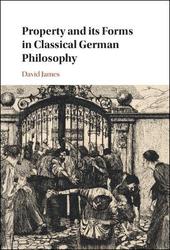
|
Property and its Forms in Classical German Philosophy
Hardback
Main Details
| Title |
Property and its Forms in Classical German Philosophy
|
| Authors and Contributors |
By (author) David James
|
| Physical Properties |
| Format:Hardback | | Pages:214 | | Dimensions(mm): Height 229,Width 152 |
|
| Category/Genre | Western philosophy from c 1900 to now |
|---|
| ISBN/Barcode |
9781009288149
|
| Classifications | Dewey:193 |
|---|
| Audience | |
|---|
| Illustrations |
Worked examples or Exercises
|
|
Publishing Details |
| Publisher |
Cambridge University Press
|
| Imprint |
Cambridge University Press
|
| Publication Date |
5 January 2023 |
| Publication Country |
United Kingdom
|
Description
The theme of property is directly relevant to some of the most divisive social and political issues today, such as wealth inequality and the question of whether governments should limit it by introducing measures that restrict the right to property. Yet what is property? And when seeking to answer this question, do we tend to identify the concept with just one dominant historical form of property? In this book, David James reconstructs the theories of property developed by four key figures in classical German philosophy - Kant, Fichte, Hegel and Marx. He argues that although their theories of property are different, the concept of social recognition plays a crucial role in all of them, and assesses these philosophers' arguments for the specific forms of property they claim should exist in a society that is genuinely committed to the idea of freedom.
Author Biography
David James is Reader in Philosophy at the University of Warwick. His previous publications include Rousseau and German Idealism: Freedom, Dependence and Necessity (Cambridge, 2013), and Practical Necessity, Freedom, and History: From Hobbes to Marx (2021).
Reviews'Property and its Forms in Classical German Philosophy challenges the liberal, 'pre-political' conception of private property stemming from John Locke that is familiar and standard in contemporary political philosophy. The book examines and defends four alternative, powerful accounts of property-from Kant, Fichte, Hegel, and Marx-that have a social component to what is mine and thine. James's thorough, learned discussion contributes not only to our understanding of German political thought but also to fundamental inquiries into the nature and basis of modern liberal capitalism.' Jeffrey Church, University of Houston 'David James brilliantly demonstrates that, beyond their controversies about economic systems, classic German philosophers share the same concept of property. It isn't primarily a relation between a person and a thing, but a system of mutual limitation of free spheres of action. This opens highly promising perspectives for the current debates on distributive justice.' Jean-Christophe Merle, University of Vechta/Universitat des Saarlandes
|